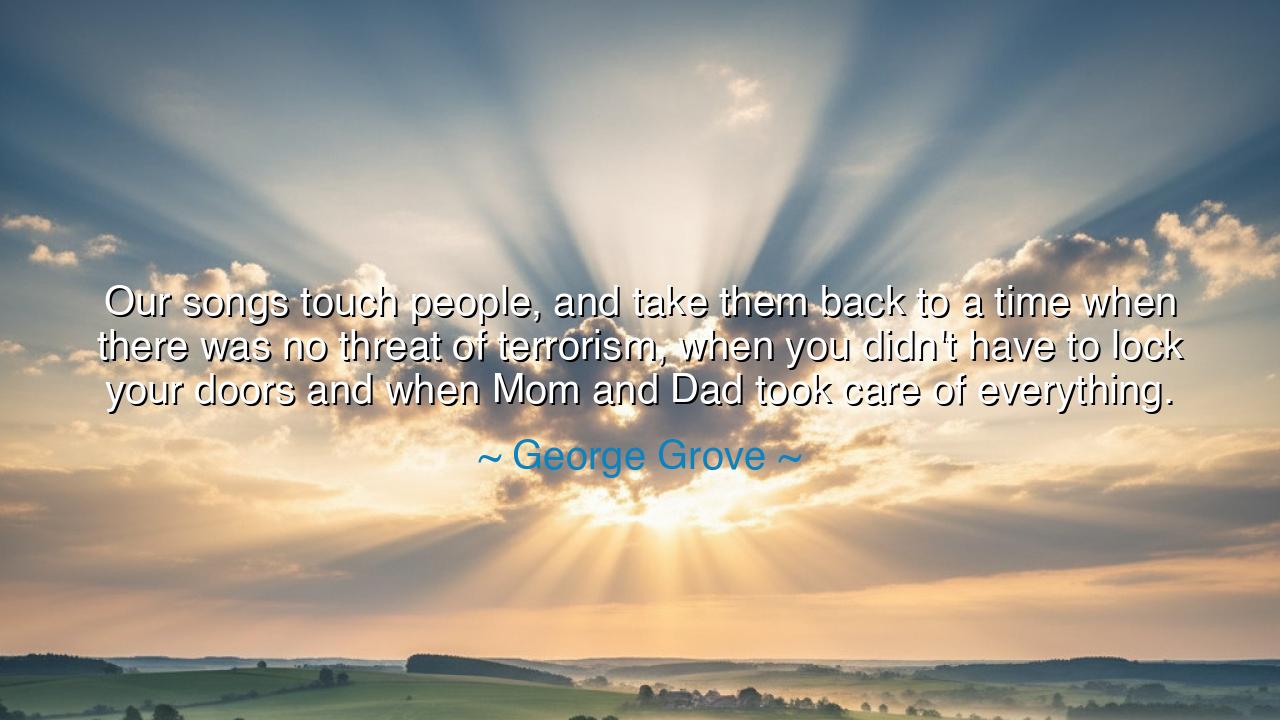
Our songs touch people, and take them back to a time when there
Our songs touch people, and take them back to a time when there was no threat of terrorism, when you didn't have to lock your doors and when Mom and Dad took care of everything.






Hear, O listeners of the old songs, the words of George Grove, who reflected on the power of music to awaken memory: “Our songs touch people, and take them back to a time when there was no threat of terrorism, when you didn’t have to lock your doors and when Mom and Dad took care of everything.” At first hearing, these words may sound like nostalgia, yet beneath them lies a deep truth about longing, innocence, and the human need to remember a simpler world.
First, let us consider the power of songs. Music is no mere entertainment, but a vessel that carries the heart backward through time. A single melody can break down the walls of years, returning the listener to moments of peace, love, or safety. Thus Grove speaks not of notes or chords, but of memory itself, awakened through harmony. In this way, songs become a bridge—not only between past and present, but between the wounded spirit of today and the innocence of yesterday.
He contrasts two worlds: one where terrorism casts a shadow, and another where trust and openness flourished. His words recall an age when life seemed unburdened, when fear did not sit constantly at the door of the heart. It is not that danger never existed, but that children and families felt protected, cushioned by a sense of order and safety. Grove reveals how music can rekindle that sense of security, even in a world where fear has grown louder.
And then comes the image of unlocked doors. What symbol could be stronger? To leave a door unbarred is to live in trust of one’s neighbors, to believe that the night will pass without threat. Today, doors are locked, alarms are set, suspicion lingers. The locked door is not merely a physical barrier but a sign of the guarded soul. Thus, when songs return listeners to the time of open doors, they awaken in them the yearning for trust restored.
Equally powerful is the memory of Mom and Dad taking care of everything. Here Grove evokes childhood itself—the season when burdens lay not on the shoulders of the young, but on parents who bore them without complaint. In that season, the child was free to play, to dream, to live untroubled by the worries of the world. The song’s gift is to return even the adult, now heavy with cares, to that state of remembered innocence, if only for a few minutes of music.
History itself gives us examples of this. Consider the songs sung by soldiers in the trenches of World War I, melodies of home that reminded them of their mothers’ voices, their fathers’ stories, the safe places far from the battlefield. These tunes did not erase the war, but they gave the soldiers strength, for they touched the deepest human longing: to return to a place of peace and belonging. Grove’s words carry the same meaning—the song becomes the lantern of memory, guiding souls back to where fear did not reign.
The lesson, then, is clear: never underestimate the power of music, memory, and simplicity. In a world heavy with alarms, suspicion, and sorrow, we must find ways to reconnect with trust, with innocence, and with the spirit of open doors. So, dear listener, take practical steps: sing the old songs with your children, share the stories of your youth, keep alive the rituals that remind you of safety and love. In doing so, you plant in their hearts a vision of a world where fear does not rule, and where the music of memory may guide them forward with hope.
Thus, as Grove has said, let the songs touch you. Let them remind you that behind all the shadows of the present, there is still a light of belonging, safety, and love. And if you carry that light into your own home, your own neighborhood, then perhaps the age of open doors and untroubled hearts can live again—not as a memory only, but as a future reborn.






AAdministratorAdministrator
Welcome, honored guests. Please leave a comment, we will respond soon